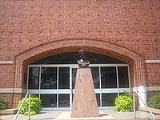
Jack London
Jack London was an American author.
Sourced
- I do not live for what the world thinks of me, but for what I think of myself.
- Letter to Charles Warren Stoddard (21 August 1903)
- Life? Bah! It has no value. Of cheap things it is the cheapest.
- "The Sea-Wolf" (1904)
- I love the flesh. I'm a pagan. “Who are they who speak evil of the clay? The very stars are made of clay like mine!”
- Letter to Charles Warren Stoddard (11 August 1905)
- Life achieves its summit when it does to the uttermost that which it was equipped to do.
- White Fang (1906)
- The trouble with him was that he was without imagination. He was quick and alert in the things of life, but only in the things, and not in the significances.
- "To Build a Fire" published as a collection of short stories in the book Lost Face (1910)
- I would rather be ashes than dust! I would rather that my spark should burn out in a brilliant blaze than it should be stifled by dry-rot. I would rather be a superb meteor, every atom of me in magnificent glow, than a sleepy and permanent planet. The proper function of man is to live, not to exist. I shall not waste my days in trying to prolong them. I shall use my time.
- The Bulletin, San Francisco, California, December 2, 1916, part 2, p. 1.
- Also included in Jack London’s Tales of Adventure, ed. Irving Shepard, Introduction, p. vii (1956)
- Life is not always a matter of holding good cards, but sometimes, playing a poor hand well.
- As quoted in Sacred Journey of the Peaceful Warrior (1991) by Dan Millman, p. 78
- Life’s not a matter of holding good cards, but sometimes playing a poor hand well.
- As quoted in "They Came to Write in Hawai‘i" by Joseph Theroux, in Spirit of Aloha (March/April 2007)
Martin Eden (1909)
- It was just such uniqueness of points of view that startled Ruth. Not only were they new to her, and contrary to her own beliefs, but she always felt in them germs of truth that threatened to unseat or modify her own convictions. Had she been fourteen instead of twenty-four, she might have been changed by them; but she was twenty-four, conservative by nature and upbringing, and already crystallized into the cranny of life where she had been born and formed. It was true, his bizarre judgments troubled her in the moments they were uttered, but she ascribed them to his novelty of type and strangeness of living, and they were soon forgotten. Nevertheless, while she disapproved of them, the strength of their utterance, and the flashing of eyes and earnestness of face that accompanied them, always thrilled her and drew her toward him. She would never have guessed that this man who had come from beyond her horizon, was, in such moments, flashing on beyond her horizon with wider and deeper concepts. Her own limits were the limits of her horizon; but limited minds can recognize limitations only in others. And so she felt that her outlook was very wide indeed, and that where his conflicted with hers marked his limitations; and she dreamed of helping him to see as she saw, of widening his horizon until it was identified with hers.
- Ch. VIII
- Much of this he strove to express to Ruth, and shocked her and made it clear that more remodelling was necessary. Hers was that common insularity of mind that makes human creatures believe that their color, creed, and politics are best and right and that other human creatures scattered over the world are less fortunately placed than they. It was the same insularity of mind that made the ancient Jew thank God he was not born a woman, and sent the modern missionary god-substituting to the ends of the earth; and it made Ruth desire to shape this man from other crannies of life into the likeness of the men who lived in her particular cranny of life.
- Ch. VIII
- Too much is written by the men who can't write about the men who do write.
- Ch. XXXII
- "Then one can't make a living out of poetry?"
"Certainly not. What fool expects to? Out of rhyming, yes."- Ch. XXXII
John Barleycorn (1913)
- I am. I was. I am not. I never am.
- Ch. I
- There are, broadly speaking, two types of drinkers. There is the man whom we all know, stupid, unimaginative, whose brain is bitten numbly by numb maggots; who walks generously with wide-spread, tentative legs, falls frequently in the gutter, and who sees, in the extremity of his ecstasy, blue mice and pink elephants.... The other type of drinker has imagination, vision. Even when most pleasantly jingled he walks straight and naturally, never staggers nor falls, and knows just where he is and what he is doing. It is not his body but his brain that is drunken.
- Ch. II
- I was five years old the first time I got drunk.
- Ch. III
- Men do not knowingly drink for the effect alcohol produces on the body. What they drink for is the brain-effect; and if it must come through the body, so much the worse for the body.
- Ch. V
- The fortunate man is the one who cannot take more than a couple of drinks without becoming intoxicated. The unfortunate wight is the one who can take many glasses without betraying a sign; who must take numerous glasses in order to get the kick.
- Ch. VI
